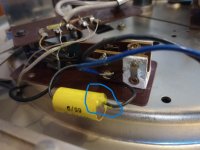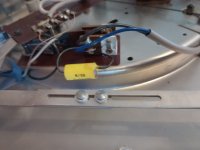hello
the motor on my turntable won't start just wondering if it could be this .01uf 400v capacitor in the circuitry? What would a failed cap look like? Thanks
Steve
the motor on my turntable won't start just wondering if it could be this .01uf 400v capacitor in the circuitry? What would a failed cap look like? Thanks
Steve
ps the yellow outer coating circled in blue has become sticky - is it a fail or "glue" used to attach it to something
whats this got to do with 'solid state' ?
seems more like an issue for
seems more like an issue for
Analogue Source
Turntables, Tonearms, Cartridges, Phono Stages, Tuners, Tape Recorders, etc.Moved to Analogue Source 🙂
Have you isolated the cap and checked to see if it is electrically leaky or short circuit?
The stickiness might be just the wrapper/label that has gone gooey.
Have you isolated the cap and checked to see if it is electrically leaky or short circuit?
The stickiness might be just the wrapper/label that has gone gooey.
Is there a fuse somewhere and has it blown?
It looks like the capacitor is connected across the mains voltage. In that case it can only cause the issue if there is a fuse somewhere earlier in the circuit that has blown because of it.
It looks like the capacitor is connected across the mains voltage. In that case it can only cause the issue if there is a fuse somewhere earlier in the circuit that has blown because of it.
Hi ammers2,
Start troubleshooting at the start. You'll need a DVM or good analogue meter.
-Chris
Start troubleshooting at the start. You'll need a DVM or good analogue meter.
- Does the motor turn freely? I'll assume you are talking about the motor shaft not turning and not the platter alone.
- Does the platter spin freely?
- Is the motor getting power? Measure right across the motor terminals.
-Chris
That might be a motor start capacitor. They do go out fairly often. It is best to replace it before you do much more troubleshooting. The fact is if it isn't dead already, it will be in the future.
The value is too small to be a start capacitor.
There is never an excuse to do anything before you use your head / mind and troubleshoot properly. I trained technicians for years. Always start with an open mind, alert senses, and a functioning brain. Never assume anything.
There is never an excuse to do anything before you use your head / mind and troubleshoot properly. I trained technicians for years. Always start with an open mind, alert senses, and a functioning brain. Never assume anything.
The first thing you do is be sure the motor (etc) turns freely and check the motor with an Ohm meter. The capacitor is unlikely to have anything to do with your problem. If the motor shows continuity, trace the circuit switches, cords etc.
Thanks to all sorry for late reply. The turntable does spin now at all speeds not accurately at the moment. I've bought a recommended replacement cap so gonna test my soldering skills now. Cheers
The date code on that capacitor is 65/9 or September 1965. And when the switch is off, that capacitor is essentially across the mains. It would not be unusual for a plastic film capacitor of that vintage to fail when connected permanently across the mains.
It should be replaced by either an X2 safety capacitor (which means that it is intended to be connected across live and neutral) or a snubber, which is what is usually used. That is a capacitor and resistor in series in the same component. For example https://uk.farnell.com/roxburgh/re12001/cap-0-01-f-275vac-20/dp/2336106?st=snubber which is a 0.01uF X2 cap and 120 ohm resistor in series https://www.dem-uk.com/roxburgh/Data/Product_Downloads/roxburgh-re1201-rc-network-pcb-data.pdf
It should be replaced by either an X2 safety capacitor (which means that it is intended to be connected across live and neutral) or a snubber, which is what is usually used. That is a capacitor and resistor in series in the same component. For example https://uk.farnell.com/roxburgh/re12001/cap-0-01-f-275vac-20/dp/2336106?st=snubber which is a 0.01uF X2 cap and 120 ohm resistor in series https://www.dem-uk.com/roxburgh/Data/Product_Downloads/roxburgh-re1201-rc-network-pcb-data.pdf
Hi ammers2,
Yes to replacing the line capacitor. However that isn't going to fix your problem (it shouldn't!). As for incorrect speeds, your motor drive voltages are also probably knackered, the frequency sets the rotation speed.
Deal with the "pop" first, don't worry about anything else. Let us know what you measure as far as what is connected to what please.
Yes to replacing the line capacitor. However that isn't going to fix your problem (it shouldn't!). As for incorrect speeds, your motor drive voltages are also probably knackered, the frequency sets the rotation speed.
Deal with the "pop" first, don't worry about anything else. Let us know what you measure as far as what is connected to what please.
All that cap does is to suppress the noise transient that might get through the audio system when the power switch is operated. Motor does not need that cap.
Indeed - but if that cap has gone open circuit, there will not only be a pop, it could well burn out the switch contacts.
Exactly that happened on my old Quad 33 preamp (part of our kitchen sound system). There is a snubber across the mains switch contacts, and that had failed. That caused the switch contacts to completely burn out. I repaired it by buying a new old single gang pot from eBay with the same switch, taking the switch off and swapping the burnt out one with the new one. And replacing the snubber. Problem solved.
Not surprising. Like the OP's deck, when switched off the capacitor or snubber is connected straight across the mains, very possibly 365/24/7 minus a small amount of time the switch is closed and the equipment operating and being listened to. Which is why it absolutely has to be an X2 rated safety capacitor, or a snubber that includes an X2 safety capacitor.
Exactly that happened on my old Quad 33 preamp (part of our kitchen sound system). There is a snubber across the mains switch contacts, and that had failed. That caused the switch contacts to completely burn out. I repaired it by buying a new old single gang pot from eBay with the same switch, taking the switch off and swapping the burnt out one with the new one. And replacing the snubber. Problem solved.
Not surprising. Like the OP's deck, when switched off the capacitor or snubber is connected straight across the mains, very possibly 365/24/7 minus a small amount of time the switch is closed and the equipment operating and being listened to. Which is why it absolutely has to be an X2 rated safety capacitor, or a snubber that includes an X2 safety capacitor.
Last edited:
Well, the snubber is a half step anyway. The most effective solution is to place an MOV across the transformer primary (directly). This conducts any voltage kickbacks from the transformer (that's what kills the contacts), and provides lightning/over-voltage protection. Your fuse opens when this part fails.
The thing is, your transformer in the Quad is much larger than the Thorens. The voltage kickback in the Thorens isn't that big. So unless the grounding is not correct, the most you should get from that capacitor open is a "click" There may be two faults here ...
The thing is, your transformer in the Quad is much larger than the Thorens. The voltage kickback in the Thorens isn't that big. So unless the grounding is not correct, the most you should get from that capacitor open is a "click" There may be two faults here ...
- Home
- Source & Line
- Analogue Source
- failed capacitor

